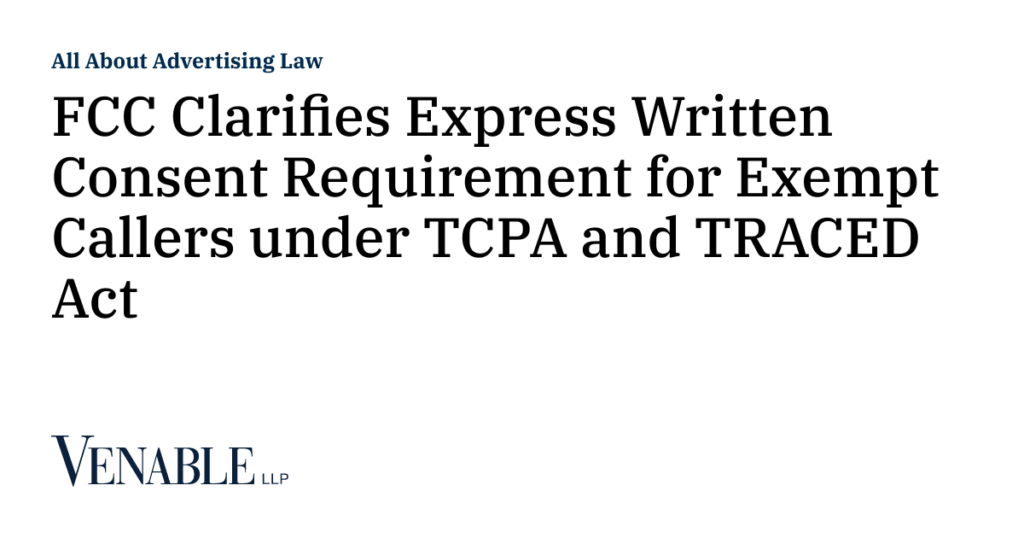FCC Clarifies Specific Written Consent Requirement for Exempt Callers below TCPA and TRACED Act

[ad_1]
On December 27, 2022, the Federal Communications Fee (FCC) launched an Order on Reconsideration and Declaratory Ruling clarifying the categorical consent necessities for calls positioned to residential landlines below the Phone Client Safety Act (TCPA) and the Phone Robocall Abuse Prison Enforcement and Deterrence Act (TRACED Act).
First, slightly background: The TCPA restricts a caller’s capacity to put phone calls to a residential landline utilizing synthetic or prerecorded voice messages with out the prior categorical consent of the referred to as social gathering, except exempted by statute or FCC rule or order.
The FCC has exempted from the TCPA’s prior categorical consent requirement sure calls made to residential landlines which might be:
- Not made for industrial functions
- Informational calls (industrial calls that don’t represent telemarketing)
- Calls from tax-exempt nonprofit organizations
Subsequently in 2019, Congress enacted Part 8 of the TRACED Act directing the FCC to additional make clear these exemptions. In 2020, the FCC launched a Report and Order that restricted the variety of exempted calls made to residential strains to a few synthetic or prerecorded voice calls inside any consecutive 30-day interval in the event that they fall below the three above-listed exemptions. The FCC required {that a} caller receive prior categorical consent to put greater than the three permitted calls.
In response to this flurry of piecemeal regulation, business events, client organizations, and people filed petitions for reconsideration, contending that the FCC’s orders and rulings inadvertently created confusion relating to the applying of prior written consent necessities below the 2020 Report and Order.
Particularly, petitioners famous that the 2020 Report and Order may very well be interpreted to require callers to acquire prior written consent from residential landline holders to name greater than thrice in a consecutive 30-day interval, even supposing a previous FCC ruling had exempted such calls from the prior written consent requirement. The petitioners requested that the FCC get rid of the brand new consent requirement solely or make clear that both oral or written consent was acceptable.
The petitioning course of finally paid off. On reconsideration, the FCC granted sure of the petitioners’ requests, confirming that exempted callers might receive both oral or written consent to exceed the numerical limits on synthetic or prerecorded calls to each residential strains and wi-fi telephone numbers. The FCC denied petitioners’ different requests, which included eliminating the numerical limits on exempted calls solely.
The amended rule will take impact six months after publication within the Federal Register.
The authors thank Jay V. Prapaisilp, a legislation clerk in Venable’s Washington, DC workplace, for his help in writing this text.
For extra insights into promoting legislation, bookmark our All About Promoting weblog and subscribe to our month-to-month publication.
[ad_2]
Source_link








